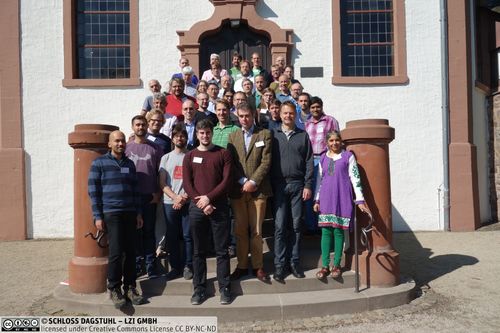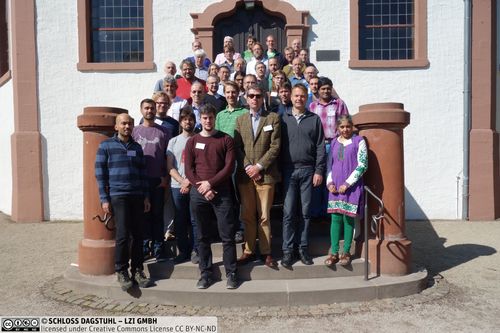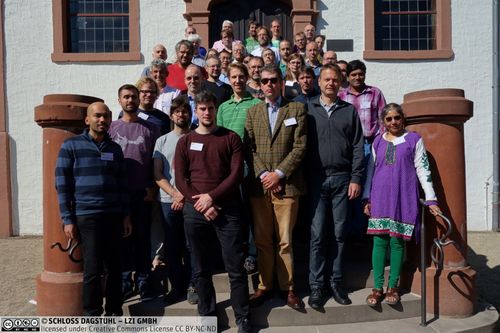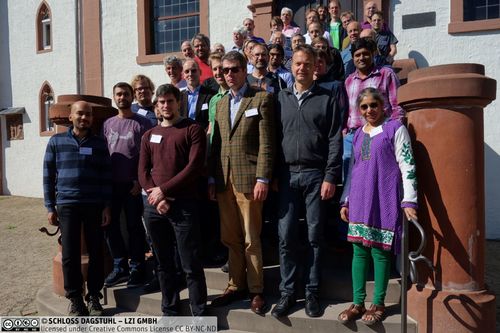Dagstuhl-Seminar 16381
SAT and Interactions
( 18. Sep – 23. Sep, 2016 )
Permalink
Organisatoren
- Olaf Beyersdorff (University of Leeds, GB)
- Nadia Creignou (Aix-Marseille University, FR)
- Uwe Egly (TU Wien, AT)
- Heribert Vollmer (Leibniz Universität Hannover, DE)
Kontakt
- Susanne Bach-Bernhard (für administrative Fragen)
Impacts
- On Linear Resolution : Preliminary version - Buss, Samuel R.; Johannsen, Jan - San Diego : University, 2016. - 13 pp..
- Relating two width measures for resolution proofs - Krebs, Andreas; Mahajan, Meena; Shukla, Anil - Rehovot : Weizmann Institute of Science, 2016 - (Electronic colloquium on computational complexity ; 164).
Programm
Propositional satisfiability (or Boolean satisfiability) is the problem of determining whether the variables of a Boolean formula can be assigned truth values in such a way as to make the formula true. This satisfiability problem, SAT for short, stands at the crossroads of logic, graph theory, computer science, computer engineering and computational physics. Unsurprisingly SAT is of central importance in various areas of computer science including algorithmics, verification, planning, hardware design and artificial intelligence. It can express a wide range of combinatorial problems as well as many real-world ones.
SAT is very significant from a theoretical point of view. Since the Cook-Levin theorem, which has identified SAT as the first NP-complete problem, it has become a reference for an enormous variety of complexity statements. The most prominent one is the question “is P equal to NP?” Proving that SAT is not in P would answer this question negatively. Restrictions and generalizations of the propositional satisfiability problem play a similar rôle in the examination of other complexity classes and relations among them. In particular quantified versions of SAT, QSAT (in which Boolean variables are universally or existentially quantified), as well as variants of SAT in which some notion of minimality is involved, provide prototypical complete problems for every level of the polynomial hierarchy.
During the past three decades, an impressive array of diverse techniques from mathematical fields, such as propositional and first-order logic, model theory, Boolean function theory, complexity, combinatorics and probability has contributed to a better understanding of the SAT problem. Although significant progress has been made on several fronts, most of the central questions remain unsolved so far.
One of the main aims of the seminar is to bring together researchers from different areas of activity who are not only interested in the classical satisfiability problem, but in variations and extensions of it. The goal is that they communicate state-of-the-art advances and embark on a systematic interaction that will enhance the synergy between the different areas. Variations and extensions of SAT include varying the computational goals, considering other propositional logics and extending the problem to formulas with Boolean quantifiers. Computational complexity and proof complexity are then two topics from which one can expect cross-fertilization during this seminar.
Brief Introduction to the Topic
Propositional satisfiability (or Boolean satisfiability) is the problem of determining whether the variables of a Boolean formula can be assigned truth values in such a way as to make the formula true. This satisfiability problem, SAT for short, stands at the crossroads of logic, graph theory, computer science, computer engineering and computational physics. Indeed, many problems originating from one of these fields typically have multiple translations to satisfiability. Unsurprisingly, SAT is of central importance in various areas of computer science including algorithmics, verification, planning, hardware design and artificial intelligence. It can express a wide range of combinatorial problems as well as many real-world ones.
SAT is very significant from a theoretical point of view. Since the Cook-Levin theorem, which identified SAT as the first NP-complete problem, it has become a reference for an enormous variety of complexity statements. The most prominent one is the question "is P equal to NP?" Proving that SAT is not in P would answer this question negatively. Restrictions and generalizations of the propositional satisfiability problem play a similar rôle in the examination of other complexity classes and relations among them. In particular, quantified versions of SAT (QSAT, in which Boolean variables are universally or existentially quantified) as well as variants of SAT in which some notion of minimality is involved, provide prototypical complete problems for every level of the polynomial hierarchy.
During the past three decades, an impressive array of diverse techniques from mathematical fields, such as propositional and first-order logic, model theory, Boolean function theory, complexity, combinatorics and probability, has contributed to a better understanding of the SAT problem. Although significant progress has been made on several fronts, most of the central questions remain unsolved so far.
One of the main aims of the Dagstuhl seminar was to bring together researchers from different areas of activity in SAT so that they can communicate state-of-the-art advances and embark on a systematic interaction that will enhance the synergy between the different areas.
Concluding Remarks and Future Plans
The organizers regard the seminar as a great success. Bringing together researchers from different areas of theoretical computer science fostered valuable interactions and led to fruitful discussions. Feedback from the participants was very positive as well. Many attendants expressed their wish for a continuation.
Finally, the organizers wish to express their gratitude toward the Scientific Directorate of the Center for its support of this seminar, and hope to be able to continue this series of seminars on SAT and Interactions in the future.
 Olaf Beyersdorff, Nadia Creignou, Uwe Egly, and Heribert Vollmer
Olaf Beyersdorff, Nadia Creignou, Uwe Egly, and Heribert Vollmer
- Olaf Beyersdorff (University of Leeds, GB) [dblp]
- Joshua Lewis Blinkhorn (University of Leeds, GB) [dblp]
- Ilario Bonacina (KTH Royal Institute of Technology - Stockholm, SE) [dblp]
- Sam Buss (University of California - San Diego, US) [dblp]
- Florent Capelli (University Paris-Diderot, FR) [dblp]
- Leroy Nicholas Chew (University of Leeds, GB) [dblp]
- Nadia Creignou (Aix-Marseille University, FR) [dblp]
- Arnaud Durand (University Paris-Diderot, FR) [dblp]
- Uwe Egly (TU Wien, AT) [dblp]
- Shiguang Feng (Universität Leipzig, DE) [dblp]
- John Franco (University of Cincinnati, US) [dblp]
- Nicola Galesi (Sapienza University of Rome, IT) [dblp]
- Anselm Haak (Leibniz Universität Hannover, DE) [dblp]
- Miki Hermann (Ecole Polytechnique - Palaiseau, FR) [dblp]
- Marijn J. H. Heule (University of Texas - Austin, US) [dblp]
- Edward A. Hirsch (Steklov Institute - St. Petersburg, RU) [dblp]
- Kazuo Iwama (Kyoto University, JP) [dblp]
- Jan Johannsen (LMU München, DE) [dblp]
- Peter Jonsson (Linköping University, SE) [dblp]
- Oliver Kullmann (Swansea University, GB) [dblp]
- Victor Lagerqvist (TU Dresden, DE) [dblp]
- Florian Lonsing (TU Wien, AT) [dblp]
- Meena Mahajan (The Institute of Mathematical Sciences, India, IN) [dblp]
- Barnaby Martin (Durham University, GB) [dblp]
- Arne Meier (Leibniz Universität Hannover, DE) [dblp]
- Stefan Mengel (CNRS, CRIL - Lens, FR) [dblp]
- Jakob Nordström (KTH Royal Institute of Technology - Stockholm, SE) [dblp]
- Steffen Reith (Hochschule RheinMain, DE) [dblp]
- Rahul Santhanam (University of Oxford, GB) [dblp]
- Dominik Alban Scheder (Shanghai Jiao Tong University, CN) [dblp]
- Irena Schindler (Leibniz Universität Hannover, DE) [dblp]
- Johannes Schmidt (Jönköping University, SE) [dblp]
- Uwe Schöning (Universität Ulm, DE) [dblp]
- Anil Shukla (The Institute of Mathematical Sciences, India, IN) [dblp]
- Sarah Sigley (University of Leeds, GB)
- Stefan Szeider (TU Wien, AT) [dblp]
- Jacobo Torán (Universität Ulm, DE) [dblp]
- Heribert Vollmer (Leibniz Universität Hannover, DE) [dblp]
- Christoph M. Wintersteiger (Microsoft Research UK - Cambridge, GB) [dblp]
Verwandte Seminare
Klassifikation
- data structures / algorithms / complexity
Schlagworte
- satisfiability problems
- computational complexity
- proof complexity
- combinatorics
- solvers for satisfiability problems
- reductions to satisfiability problems





 Creative Commons BY 3.0 Unported license
Creative Commons BY 3.0 Unported license
